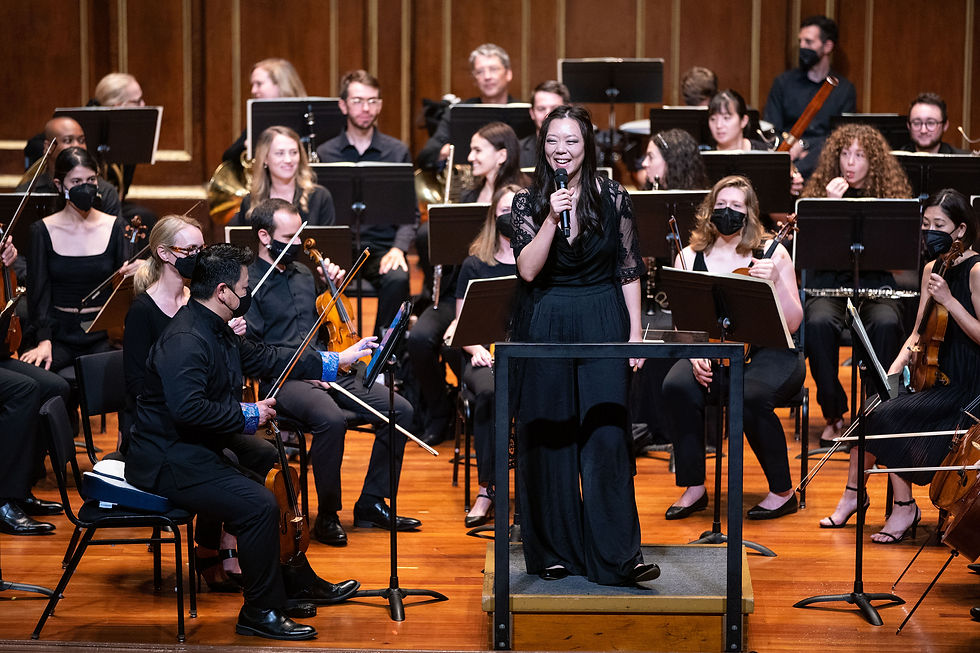Creating “Re-Reading”
- Alyssa Wang

- Apr 1, 2023
- 4 min read
BFO Artistic Director, Alyssa Wang, describes the process of creating the Chamber Series program, “Re-Reading.”

Partnering with the Boston Athenæum for a chamber music series is an Artistic Director’s dream. My idea to pair music with the rotating special exhibits of the Athenæum meant that I would have an infinite source of programming inspiration, and that there would always be an organic through-line holding every concert together. Creating these programs has been one of the highlights of my time with the Boston Festival Orchestra, and it has allowed me to explore the truly incredible interdisciplinary potential of classical music.
“Re-Reading” is based on the Athenæum’s special exhibit titled Re-Reading the Collection, which reinterprets the library’s collections to reflect a more expansive view of American art and history. The collection includes a diverse array of rare books, works on paper, paintings, and sculpture, which together aim to bring a fresh perspective to lesser-known and beloved materials alike. Similarly, I wanted to pair this collection with music that reflects hidden voices in classical composition, pieces that invite us to consider the oftentimes exclusionary constructs of race, gender, and class that are a part of America’s history.
The Music

On the topic of America’s history, I felt it important to showcase American compositional voices, and as such, four out of five of the selected works for “Re-Reading” are composed by Americans. Carlos Simon’s where two or three are gathered is a short meditation for violin and cello that is part of a larger work called Requiem for the Enslaved, a mixed chamber composition that was recently nominated for Best Composition at the 2023 Grammy’s–a recording that just so happens to feature both Nick (BFO Executive Director) and myself! The piece was commissioned by Georgetown University as part of the mission of their Committee for Slavery, Memory, Reconciliation, which was formed after news came to light that the university had sold 272 slaves to pay off debts in 1838. David Baker, who recently passed in 2016, championed jazz and education. His Roots II, for piano trio, celebrates the African dance origins of his culture. Florence Price is having her Renaissance today, and is now being recognized as one of the most important American compositional voices of her time. I decided to give our brilliant pianist, Routing Li, a piano solo, since that is the instrument in which Price was most prolific. Her charming Cherry Blossoms in Her Hair is a debutante waltz that I believe paired beautifully with the salon space and the various paintings of elegant men and women. The African American voice in this country’s history is fundamental to the artistic spirit of our culture, and pairing music by Black voices highlights various paintings in the Athenæum, such as Late Afternoon by Allan Rohan Crite, who wanted to depict the daily life of Boston’s African American community.

Alongside so many local painters whose works are featured on the salon wall, it seemed only fitting to include an American composer who has contributed so much to the local Boston musical landscape. I was drawn to the darkly romantic music of Alexandra du Bois’ L'apothéose d'un rêve, a composition from 2005 depicting the moody, transfiguring, and sweeping American landscapes. Du Bois is Composition Chair at the Longy School of Music.

Finally, I was drawn to the graceful and elegant depictions of women on the salon wall, particularly the relationship behind the portrait of Elizabeth Vaughan Okie, an accomplished artist and fiancé and muse of local artist William McGregor Paxton. I was immediately reminded of a parallel between romantic composer pairing Robert and Clara Schumann, who were both accomplished pianists. Clara Shumann’s Three Romances for Violin and Piano ranks among some of the most beautiful salon pieces for violin. We have very few compositions to enjoy by Clara, whether due to her societal circumstances as a woman in the 19th century or perhaps the overwhelming responsibility of caring for (and being married to) Robert Schumann. Hearing her Romances is like opening a window to the past where she can step through and have her time in the spotlight that is so deserved.
The Process
The first step in programming a BFO Chamber Series concert is to identify the themes that connect the whole event. This is dependent largely on the exhibits that the Athenæum is exhibiting at the time of the concert. In the case of “Re-Reading,” I took the exhibit’s themes of re-examination and made lists of composers whose music spoke to this theme. Much of classical music has been dominated by the European male demographic, but as it has spread to all corners of the earth, the musicians and composers are more diverse than ever before. Now, we are faced with a unique present, where we have the privilege of acknowledging that certain voices have been excluded in the past and, in response, bring those hidden voices to life. I am proud that this is a mostly American program, and that so many of the artists in this concert have direct Boston connections. To me, it speaks to the revolutionary spirit of this city, and to our collective efforts to ensure that our future is one that values equality, representation, and community.
Submit A Blog Topic
Have a topic you want us to discuss? A music question you’ve been dying to ask? From musician interviews, favorite playlists, think pieces about the performing arts, and more, we’ll take your requests into account! Send us your wild ideas, strong opinions, and thoughtful musings here. And don’t worry, we’ll be sure to include this link at the end of every blog post for when inspiration strikes!




Comments